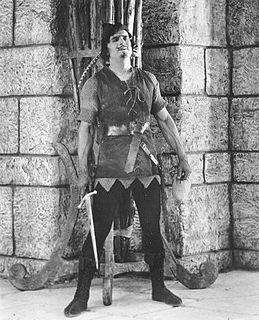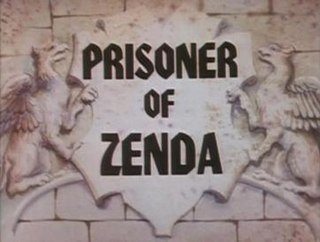
The Prisoner of Zenda is an 1894 adventure novel by Anthony Hope, in which the King of Ruritania is drugged on the eve of his coronation and thus is unable to attend the ceremony. Political forces within the realm are such that, in order for the king to retain the crown, his coronation must proceed. Fortuitously, an English gentleman on holiday in Ruritania who resembles the monarch is persuaded to act as his political decoy in an effort to save the unstable political situation of the interregnum.

Sir Anthony Hope Hawkins, better known as Anthony Hope, was an English novelist and playwright. He was a prolific writer, especially of adventure novels but he is remembered predominantly for only two books: The Prisoner of Zenda (1894) and its sequel Rupert of Hentzau (1898). These works, "minor classics" of English literature, are set in the contemporaneous fictional country of Ruritania and spawned the genre known as Ruritanian romance, works set in fictional European locales similar to the novels. Zenda has inspired many adaptations, most notably the 1937 Hollywood movie of the same name.

A swashbuckler is a heroic archetype in European adventure literature that is typified by the use of a sword, acrobatics and chivalric ideals. The archetype also became common as a film genre.
Dick Clement is an English writer known for his writing partnership with Ian La Frenais. They are most famous for television series including The Likely Lads, Whatever Happened to the Likely Lads?, Porridge, Lovejoy and Auf Wiedersehen, Pet.

Rupert of Hentzau is a sequel by Anthony Hope to The Prisoner of Zenda, written in 1895 but not published until 1898.
A dual role refers to one actor playing two roles in a single production. Dual roles may be deliberately written into a script, or may instead be a choice made during production, often due to a low budget. In film and television, dual roles are often used for comic effect, or to depict identical twins. In a theatrical production where more than one actor plays multiple characters, it is sometimes referred to as an "Ironman" cast.
Jonathon Morris is an English actor and former television presenter.

The Prisoner of Zenda is a 1979 American comedy film directed by Richard Quine and adapted from the adventure novel by Anthony Hope, first published in 1894. The novel tells the story of a man who has to impersonate a king, whom he closely resembles, when the king is abducted by enemies on the eve of his coronation. An earlier adaptation of the story was made into a film in 1952 starring Deborah Kerr and Stewart Granger, and directed by Richard Thorpe.

The Prisoner of Zenda is a 1937 American black-and-white adventure film based on Anthony Hope's 1894 novel of the same name and the 1896 play.

The Prisoner of Zenda is a 1952 film version of the classic novel of the same name by Anthony Hope and a remake of the famous 1937 film version and the 1922 silent version as well. This version was made by Loew's and Metro-Goldwyn-Mayer, directed by Richard Thorpe and produced by Pandro S. Berman.

Swashbuckler films are a subgenre of the adventure film genre, often characterised by swordfighting and adventurous heroic characters, known as swashbucklers. Real historical events often feature prominently in the plot, morality is often clear-cut, heroic characters are clearly heroic and even villains tend to have a code of honour. There is often a damsel in distress and a romantic element.

The Prisoner of Zenda is a 1922 American silent adventure film directed by Rex Ingram, one of the many adaptations of Anthony Hope's popular 1894 novel The Prisoner of Zenda and the subsequent 1896 play by Hope and Edward Rose.

Prisoner of Zenda is an Australian 49-minute direct-to-video animated film from Burbank Films Australia. It was originally released in 1988. The film is based on Anthony Hope's classic English novel, The Prisoner of Zenda, first published in 1894, and was adapted by Leonard Lee. It was produced by Roz Phillips and featured original music by John Stuart. The copyright in this film is now owned by Pulse Distribution and Entertainment and administered by digital rights management firm NuTech Digital.
The Prisoner of Zenda, Inc is a 1996 television film starring William Shatner and Jonathan Jackson. It was produced for Showtime Networks under their family division, and first aired September 1996. The film was written by Rodman Gregg and Richard Clark.

Richard Lee Jackson is an American actor and musician.
The Prisoner of Zenda is a 1913 silent film adaptation of a play by Edward E. Rice, which was in turn based on the 1894 Anthony Hope novel of the same name. It was directed by Edwin S. Porter and Hugh Ford, and starred stage actor James K. Hackett, Beatrice Beckley and David Torrence.

Lillian Harmer was an American character actress.

Emmett Carleton King was an American actor of the stage and screen.
The Prisoner of Zenda is a 1915 British silent adventure film directed by George Loane Tucker and starring Henry Ainley, Jane Gail and Gerald Ames. Shot at Twickenham Studios, it is an adaptation of 1894 novel The Prisoner of Zenda by Anthony Hope. A film based on the sequel Rupert of Hentzau was released shortly afterwards with the same director and cast.

Rupert of Hentzau is a 1923 American silent adventure film directed by Victor Heerman and starring Bert Lytell, Elaine Hammerstein and Lew Cody. It is an adaptation of Anthony Hope's 1898 novel Rupert of Hentzau, the sequel to The Prisoner of Zenda.













